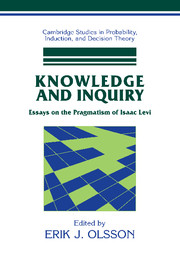Book contents
- Frontmatter
- Contents
- List of Contributors
- Preface
- Introduction: The Pragmatism of Isaac Levi
- 1 Isaac Levi and His Pragmatist Lineage
- 2 Is Pragmatist Truth Irrelevant to Inquiry?
- 3 The Knowledge Business
- 4 Infallibility and Incorrigibility
- 5 Why Inconsistency Is Not Hell: Making Room for Inconsistency in Science
- 6 Levi on Risk
- 7 Vexed Convexity
- 8 Levi's Chances
- 9 Isaac Levi's Potentially Surprising Epistemological Picture
- 10 Isaac Levi on Abduction
- 11 Potential Answers – To What Question?
- 12 Levi and the Lottery
- 13 The Value of Truth and the Value of Information: On Isaac Levi's Epistemology
- 14 Decision-Theoretic Contraction and Sequential Change
- 15 Deciding What You Know
- 16 Levi's Ideals
- 17 The Mind We do Not Change
- 18 Psychoanalysis as Technology
- 19 Levi on Money Pumps and Diachronic Dutch Books
- 20 Levi on the Reality of Dispositions
- 21 Replies
- Index
- References
1 - Isaac Levi and His Pragmatist Lineage
Published online by Cambridge University Press: 05 March 2010
- Frontmatter
- Contents
- List of Contributors
- Preface
- Introduction: The Pragmatism of Isaac Levi
- 1 Isaac Levi and His Pragmatist Lineage
- 2 Is Pragmatist Truth Irrelevant to Inquiry?
- 3 The Knowledge Business
- 4 Infallibility and Incorrigibility
- 5 Why Inconsistency Is Not Hell: Making Room for Inconsistency in Science
- 6 Levi on Risk
- 7 Vexed Convexity
- 8 Levi's Chances
- 9 Isaac Levi's Potentially Surprising Epistemological Picture
- 10 Isaac Levi on Abduction
- 11 Potential Answers – To What Question?
- 12 Levi and the Lottery
- 13 The Value of Truth and the Value of Information: On Isaac Levi's Epistemology
- 14 Decision-Theoretic Contraction and Sequential Change
- 15 Deciding What You Know
- 16 Levi's Ideals
- 17 The Mind We do Not Change
- 18 Psychoanalysis as Technology
- 19 Levi on Money Pumps and Diachronic Dutch Books
- 20 Levi on the Reality of Dispositions
- 21 Replies
- Index
- References
Summary
INTRODUCTION
Isaac Levi stands out as one of the most important philosophers who has worked in the pragmatist tradition. Like his predecessors, Charles Peirce, William James, and John Dewey, Levi insists that we must take practice and context seriously when we think about knowledge and truth. Each of the classical pragmatists followed through on this central insight in a different way and each has motivated a different kind of contemporary pragmatist. Levi's kind focusses on according our existing corpus of belief its actual and proper status in epistemology. What we are concerned with in inquiry – in seeking knowledge – is the revision of that corpus of belief as opposed to the pedigree or origin of belief. What we are concerned with is whether we should retain a commitment or whether we should abandon it in favor of an alternative commitment.
Levi seems to sometimes take himself to be closest to Dewey, in whose old department – Columbia – Levi spent the bulk of his career. They both focus on the problem-solving nature of knowledge. But it is more apt, I suggest, to think of Levi as the inheritor of Peirce's position. Levi has himself acknowledged the similarities. But he also identifies what he takes to be significant gulfs between his position and Peirce's. My aim in this chapter is to show that these are not as wide as they might first appear.
- Type
- Chapter
- Information
- Knowledge and InquiryEssays on the Pragmatism of Isaac Levi, pp. 18 - 31Publisher: Cambridge University PressPrint publication year: 2006
References
- 1
- Cited by

